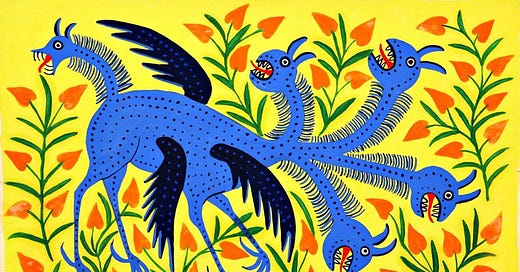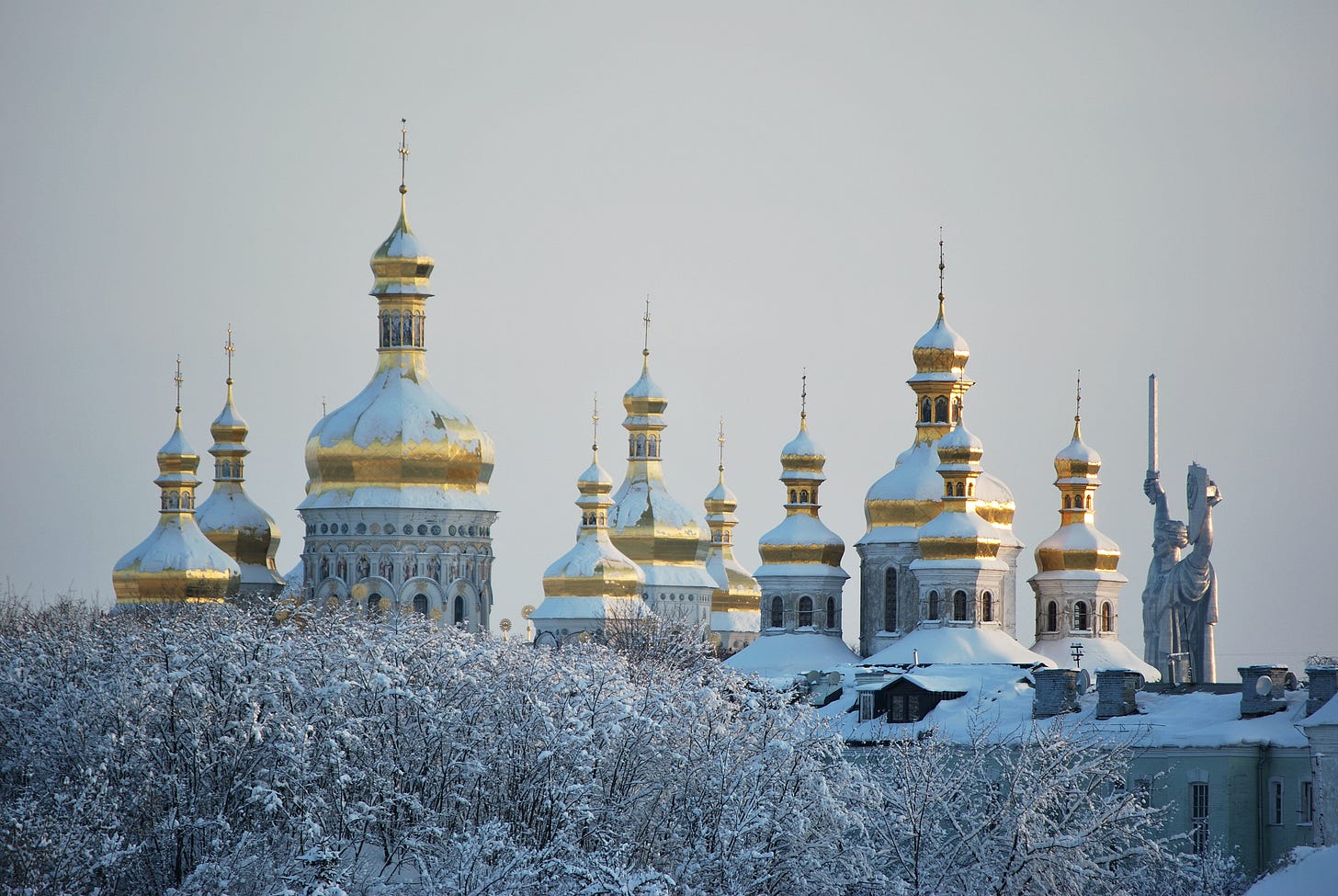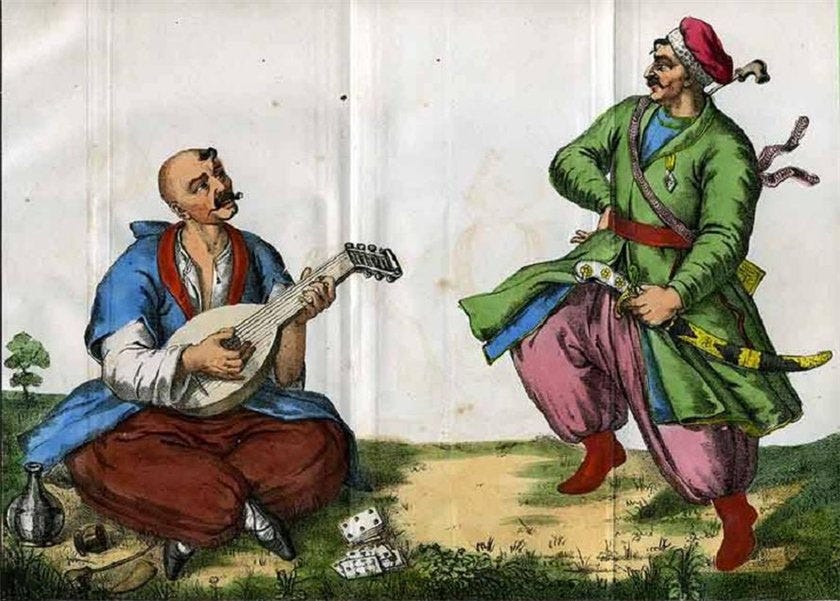Welcome back.
These are indeed troubling times. When finally a growing number of cultural institutions and professionals in Europe started to adjust to the challenges of #climatechange and #digitaltransformation, just in that moment, a despot in Russia decided to accelerate and expand a war in Europe, which had started already in 2014, but was mostly forgotten to the rest of the world.
War leads not only to incredible sufferings, but also to the destruction of #CulturalHeritage. Its protection brings heroic stories, proving to all, how important heritage indeed is - and how much a culture can just mean "a belonging".
This war in particular was begun and justified with invented “Culture-War” rhetoric. Fascist propaganda, screaming through all Russian media channels, multiplied worldwide by willing henchman and sycophants, that #Ukraine actually would be an artificial culture-construct, should come back to “mother Russia” and has no right or reason to exist as a country, a nation, a people. Obviously the propaganda could not be further from the truth and fortunately there has been major #resistance on all levels.
It is not easy to detach ones own attention from the ongoing genocide in SouthEast Europe - yet we nevertheless have to try - every day. We will not forget and come back to this subject. Ukraine is a culturally rich country and its culture will not be destroyed.
Yet, the aforementioned challenges in the Cultural & Creative field still remain and also require our attention. This is why I have reestablished my efforts to publish the Culture Journal with an increased regularity: to bring to you selected information and knowledge about these challenges and changes in Culture in Europe.
Stay strong and positive,
Wigbert Boell
content
Ukraine: sources & resources (part 1)
Climate Champions
upcoming events
good to know: Maria Prymachenko
photo credits
Ukraine: sources & resources (part 1)
The unjustified attack on a free country fortunately evoke a great solidarity within Europe. Leaving the intense discussion about energy embargo (it is necessary) and weapon deliveries (could be more) beside, the protection of the culture & cultural heritage in the country is of utmost importance. There are 7 recognized World Heritage Sites in Ukraine, hundreds of museums and theatres, millions of documents in historical archives … And all these are in danger. Some are already destroyed. And with the expressive goal to eradicate Ukraine, its people and its culture (which is a definition of “genocide”), who knows, how much of the cultural history of the country will be gone…
Fortunately - better late than never - the invasion on February 24th, 2022 led to far reaching support in general, as well as help, support offers and resources for the culture field in particular.
Here are just a few examples:
Artists at Risks runs a voluminous & frequently updated resource page via shared google docs with over 500 resource links in all Europe —>> “UKRAINE: Emergency Temporary Relocation Resources for artists and cultural workers”
including (by the way & rightfully so) also an emergency email contact for "DISSIDENT BELARUSIAN and RUSSIAN artists and cultural workers at risk”
The “Culture of Solidarity Fund - Ukraine special edition” issues grants between €5,000 to €40,000 to applicants on a rolling basis - organized by the European Cultural Foundation in coordination with other funders
the European Festival Association (EFA) runs a “Festivals for Peace” page with an overview of various initiatives, which is regularly updated
SUCHO - Saving Ukrainian Cultural Heritage Online - is a “...group of more than 1,300 cultural heritage professionals – librarians, archivists, researchers, programmers – working together to identify and archive at-risk sites, digital content, and data in Ukrainian cultural heritage institutions while the country is under attack.” - running already a google doc list of over 1000 list entries !
from the Kharkiv Holocaust Museum
“Emergency resources for Ukranian artists” from the magazine ArtConnect is a “living list" with international contact points
So no, we are not helpless. We can support initiatives, keep talking about it in our field and never give up our support for democracy, the values of culture and cultural heritage. Do you know other initiatives? Who is missing on this list?
Climate Champions
As mentioned before, the other major crisis is evident, as temperatures in India & Pakistan reach almost 50°C (122 °F). We know, humans can hardly survive this heat - but how does the #ClimateCrisis effect #CulturalHeritage and the local culture in general?
According to many projections, Europe and other “rich countries" may be lucky enough to escape the worst of the climate disasters, even though floods and droughts, wildfires and storms are already showing natures´ might in our backyard. Yet, compared to many places, we are and will be still privileged. Consequently it remains our human duty to support and help the rest of the world. Cultural cooperation projects are one way to do so; another way is to seriously transform our cultural “industry” into a green and sustainable future.
In the new section “climate champions” I will briefly introduce organizations, who are on the forefront of the fight in Europe. Many of you probably know the first one on the list:
organization: Julie´s Bicycle
location: London, UK
founded: 2006
led by: Alison Tickell (founder & CEO)
description: Julie’s Bicycle is a pioneering not-for-profit, mobilising the arts and culture to take action on the climate and ecological crisis. Founded by the music industry in 2007 and now working across the arts and culture, JB has partnered with over 2000 organisations in the UK and internationally.
mission: Combining cultural and environmental expertise, Julie’s Bicycle focuses on high-impact programmes and policy change to meet the climate crisis head-on. JB supports the arts and culture to:
Become net zero carbon and restore nature.
Inspire public action on climate and ecology.
Champion environmental justice and fairness.
web: https://juliesbicycle.com/
upcoming (selected) events
🎟 May 9: Europe Day
#EuropeDay is a day celebrating “peace and unity in Europe”, in commemoration of the Schuman Declaration of 9 May 1950." streaming live via: https://europeday.eu/
🎫 May 10 - Launch of the “discussion paper” for the 9th World Summit on Arts & Culture in Stockholm, SWE (May 2023) …
“…This 9th edition of the World Summit Discussion Paper will spark initial thinking around some of the complex issues surrounding artistic freedom to be explored in the programme in 2023, and the ways in which we might respond. The publication intends to situate our conversations in the wider global context, as well as the more local context in which we will meet…”
🎟 May 10 - June 12: Digital Storytelling Festival
“… Digital Storytelling Festival is the international creative contest that brings people and cultural heritage together. It’s hosted by Europeana and The Heritage Lab, nonprofits from Europe and India with a shared passion for storytelling and culture…”
🎫 May 18: International Museum Day 2022: “the Power of Museums”
“…The objective of International Museum Day (IMD) is to raise awareness about the fact that, “Museums are an important means of cultural exchange, enrichment of cultures and development of mutual understanding, cooperation and peace among peoples…”
It is organized since 1977 by the International Council of Museums - ICOM.
🎟 June 9-12: New European Bauhaus Festival
“…The Festival brings together people from all walks of life to debate and shape our future. A future that is sustainable, inclusive and beautiful. It is a great opportunity to network, exchange and celebrate – from science to art, from design to politics, from architecture to technology. The Festival brings the European Green Deal at the heart of our daily lives…”
(for more on the NEB, read my intro from 2021: ”The New European Bauhaus” )
good to know: about Maria Prymachenko
Maria Prymachenko (1909-1997) was a Ukrainian folk art painter. A self-taught artist, she worked in painting, embroidery and ceramics.
"...Maria Prymachenko is one of the most famous Ukrainian artists, a bright representative of “naive art”, a winner of Shevchenko National Prize (1966). In 2009, Likhachev boulevard in Kyiv was renamed in her honor. She combines remarkably drawing and painting in her art. Her bright pictures can be classified both as graphical painting and painting graphics…”
source: Maria Prymachenko in the Ukrainian Art Library ….
Her painting of the dragons from above can be found at the Croatian Museum of Naive Art
“...According to the Ukrainian Ministry of Foreign Affairs, Russian troops destroyed 25 works by Prymachenko when they shelled the Ivankiv Historical and Local History Museum…"
quoted by (and discovered via) ArtConnect: “Emergency resources for Ukranian artists”
The year 2022 is almost half gone. Clearly the twenties of the new millennium have shown humanity already how vulnerable we are - and how fragile our global system is. So some roles of culture become ever more important: reflecting on the present in coordination with history; offering aesthetic escape routes; giving hope in unsettling times; connecting to traditions and cultural roots…
The list of cultural values is long. What are your thoughts on this? How important is the role of culture in light of these challenges?
Don´t hesitate to write and comment. This project (still in its early stages) is specifically open for feedback and suggestions.
And don´t forget to subscribe, if you have not done so already - or to recommend this newsletter to some friends and colleagues.
Merci beaucoup !
image credits
“A Dragon Descends on Ukraine” (1987) - painting by Maria Prymachenko
“Domes of the Kyiv Pechersk Lavra in winter”, Kyiv, 2021 - photo by Ganna Aibetova on Unsplash
“no music on a dead planet” - from the website of Julie´s Bicycle
“National History Museum” - photo by “Sergey UA Kiev” - via wikipedia
“Maria Prymachenko” - from the website of Ukrainian Art Library
“Cossack playing Bandura” - Public Domain - via wikipedia









